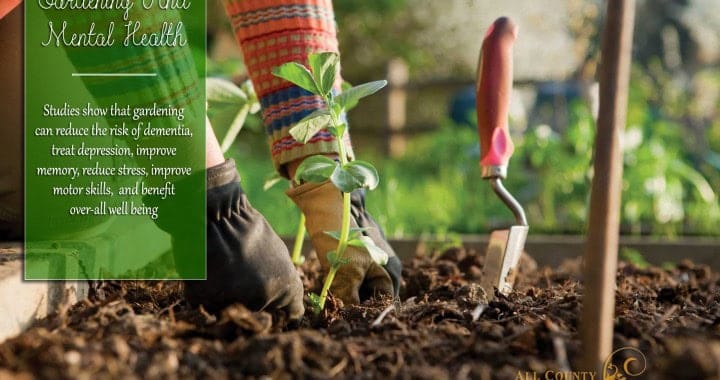Studies Show That Gardening Can Reduce the Risk Of Dementia, Depression, and Improve Memory
Any gardener can tell you that after a few hours with their hands in the dirt, they are rejuvenate and refresh. Now, recent studies into the effects of gardening on mental health are taking huge steps toward. Scientifically, proving that these improvements are not just a product of the placebo effect. And now, the science can back it up. Making the decision to add a garden may play a crucial role in preventing crippling ailments.
Gardening and Dementia
Some research suggests that gardening can help lower the risk of developing dementia. In two separate studies, researchers follow people in their 60s and 70s for up to 16 years. Their observations, conclude that those who garden regularly had a 36% and 47% lower risk of dementia. Compare to non-gardeners, even when a range of other health factors were taken into account.
The results suggest that the physical and mental activity involve in gardening may have a positive influence.
For people who are experiencing mental decline, walking in a garden may be therapeutic. Many homes which are design to house people with dementia, now have “wander” or “memory” gardens on their grounds. These gardens are design for residents with Alzheimer’s disease, allowing them to walk through them without getting lost. The sights, smells, and sounds of the garden are said to promote relaxation and reduce stress.
Gardening and Depression
One of many scientific studies conducte on the subject happen in Norway. The study look at a group of people who had been diagnose with depression, persistent low mood, or “bipolar II disorder” . For the study, the participants spent six hours a week growing flowers and vegetables in gardens. The results were clear. After three months, half of the participants had experience a measurable improvement in their depression symptoms. What’s more, their mood continue to improve three months after the gardening program end. Some scientists suggest that it is simply the novelty of gardening to subjects which produce the results. However, some experts have a much more radical explanation for how gardening might ease depression; Bacteria.
What The Experts Say
Christopher Lowry, Ph.D., an assistant professor at the University of Colorado at Boulder, has been injecting mice with Mycobacterium vaccae, a harmless bacteria commonly found in soil. He has found that they increase the release and metabolism of serotonin in parts of the brain that control cognitive function and mood.
Now, it is important to note that exposure to such bacteria is in no way a replacement for taking a prescription anti-depressant. Suggesting that the main reason we are experiencing depression is that we are no longer expose to these bacteria. Simply out: when our society was less developed, the majority of people spent time digging in the dirt or touching soil, exposing them to bacteria. In modern times, the majority of people don’t make contact with soil and thus don’t make contact with the Mycobacterium vaccae we used to.
(for further reading on bacteria and mental health, read this blog by Naomi Sachs on TLN: “Its in the Dirt, Bacteria in soil may make us happier, smarter“
Horticulture Therapy
One can observe the rapid growth and implementation of gardening as a therapy to help those in mental distress. NPR touched on the subject in their article titled, “Can Gardening Help Troubled Minds Heal?” which discusses a program in Hawaii. It’s called Pacific Quest which uses gardening to help troubled teens. In the program, the teens raise a garden, from seedling to dinner plate with little to no involvement with the staff. This allows the teens to problem solve for themselves, and overcome mental barriers by emotionally engaging them. And the results are proving to be incredibly positive for teens who go through the program.
Beyond that program, gardening is being utilize in a myriad of unexpect places such as detention facilities, mental health hospitals, veterans homes and more. This growth in horticulture therapy is a product of continued success when using gardening as a therapeutic tool.
In closing
Although there can be no absolutely conclusive proof that gardening improves mental health, it is extremely difficult to ignore the results. Gardening focuses the mind, it relieves the incredibly harmful “attention fatigue” which is a result of prolonge exposure to screens. It also improves motor function, reduces stress, and promotes over all well being. It can be the bacterium which seems to boost serotonin production. Or it can the joy and sense of accomplishment of watching a seed grow into a fully form plant. In conclusion, gardening is proving simple steps anyone can take to reduce their risk of mental health ailments.




